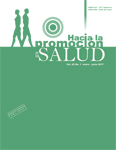Authors
Abstract
Objective: To characterize the role of contextualization pedagogies in clinical training and describe some teaching strategies that promote reflective practice nursing student in their practice. Materials and Methods: Qualitative research, ethnographic, developed in the framework of the Practicum II hospital stays II clinical course and clinical training of eleven nursing students in a Hospital of Barcelona (Spain) between 2011 and 2012. The data were collected through participant observation and non-participant, informal discussion, in-depth interview and written materials. For the analysis, the method of constant comparisons of Glaser and Strauss was used. Results: Emerged qualitative axes as pedagogies of contextualization and teaching strategies that promote the development of reasoning and clinical judgment and planning nursing care in the practice of clinical mentoring, there are some teaching strategies as reflective dialogue are evident and didactic question, with which the students verbalize the reasons for their actions, avoiding mechanical actions. Conclusion: Contextualization pedagogies employed by clinical nurses favor the development of clinical reasoning and judgment, leading the student to develop a sense of saliency.
References
2. Andrews GJ, Brodie DA, Andrews JP, Hillan E, Gail Thomas B, Wong J, et al. Professional roles and communications in clinical placements: A qualitative study of nursing students' perceptions and some models for practice. Int J Nurs Stud. 2006; 43(7): 861-874.
3. Benner P, Sutphen M, Leonard V, Day L. Educating nurses. A call for radical transformation. 1th. ed. United States of America: Jossey-Bass; 2010.
4. Carlson E, Wann-Hansson C, Pilhammar E. Teaching during clinical practice: strategies and techniques used by preceptors in nursing education. Nurse Educ Today. 2009; 29(5): 522-526.
5. Tanner C. Thinking like a nurse: A research-based model of clinical judgment in nursing. J Nurs Educ. 2006; 45: 204-211
6. Medina JL. En torno a la noción de reflexión. Àgora d'Infermeria. 2005; 9(1): 730-735.
7. Schön, DA. El profesional reflexivo: cómo piensan los profesionales cuando actúan. Barcelona, España: Paidós Ibérica S.A.; 1998
8. Solvoll B, Heggen KM. Teaching and learning care. Exploring nursing students' clinical practice. Nurse Educ Today. 2010; 30(1): 73-77.
9. Dewey J. Cómo pensamos. Nueva exposición de la relación entre pensamiento reflexivo y proceso educativo. Barcelona, España: Paidós Ibérica S.A.; 2007.
10. Diekelmann N. Narrative pedagogy: Heideggerian hermeneutical analyses of lived experiences of students, teachers, and clinicians. Adv Nurs Sci. 2000; 23(3): 53-71.
11. Benner P. Práctica progresiva en enfermería. Manual de comportamiento profesional. 1a. ed. Barcelona: Ediciones Grijalbo S.A.; 1987
12. Guba EG, Lincoln YS. Fourth generation evaluation. California: Sage Publications Inc; 1989.
13. Geertz C. La interpretación de las culturas. México: Gedisa; 1987.
14. Goetz JP, LeCompte MD. Etnografía y diseño cualitativo en investigación educativa. Madrid, España: Morata; 1988.
15. Ruiz JI, Ispizua MA. La descodificación de la vida cotidiana: Métodos de investigación cualitativa. Universidad de Deusto, Bilbao: Departamento de Publicaciones; 1989.
16. Bottorff, JL. Asuntos críticos en los métodos de investigación cualitativa. Medellin, Colombia: Editorial Universidad de Antioquia; 2003: 284-304.
17. Strauss AL, Corbin J. Bases de la investigación cualitativa: Técnicas y procedimientos para desarrollar la teoría fundamentada. Antioquia, Colombia: Editorial Universidad de Antioquia; 2002.
18. Valles MS. Entrevistas cualitativas. Madrid, España: Centro de Investigaciones Sociológicas; 2002.
19. Latorre MA, Rincón D y Arnal, J. Bases metodológicas de la investigación educativa. Barcelona, España: Editorial Experiencia; 2003.
20. Declaración de Helsinki de la Asociación Médica Mundial. Principios éticos para las investigaciones médicas que involucran seres humanos. 59ª Asamblea General, Seúl, Corea. 2008. [acceso el 15 de enero de 2010]. Disponible en: http://www.buenosaires.gob.ar/sites/gcaba/files/declaraciones_helsinski.pdf
21. Ley de Orgánica 15/1999, de 13 de diciembre, de Protección de Datos de Carácter Personal (LOPD), BOE núm. 298 & 23750.
22. Rivera LN, Medina JL. Pensamiento reflexivo del estudiante de enfermería en su prácticum clínico. Investig Enferm. Imagen Desarr. 2017; 19(1):17-30.
23. Waterkemper R, do Prado ML, Medina JL, Schmidt K. Development of critical attitude in fundamentals of professional care discipline: A case study. Nurse Educ today. 2014; 34(4): 581-585.
24. Hicks B, Geist M, House J. SAFETY: An Integrated Clinical Reasoning and Reflection Framework for Undergraduate Nursing Students. J Nurs Educ. 2013; 52(1): 59-62.
25. Kuiper RA. Integration of innovative clinical reasoning pedagogies into a baccalaureate nursing curriculum. Creat Nurs. 2013; 19(3):128-39.
26. Van Manen M. El tono en la enseñanza: el lenguaje de la pedagogía. Barcelona, España: Paidós Ibérica S.A.; 2004.
27. Rodríguez M, Medina JL. El legado del cuidado como aprendizaje reflexivo. Rev. Latino-Am. Enfermagem. 2016; 24: e2711. DOI: http://dx.doi.org/10.1590/1518-8345.0639.2711
28. Bardallo L, Rodríguez H, Chacón MD. La relación tutorial en el Prácticum de Enfermería. Revista de Docencia Universitaria. 2012; 10: 211-228.
29. Ashley J, Stamp K. Learning to think like a nurse: the development of clinical judgment in nursing students. J Nurs Educ. 2014; 53(9): 519-25.
30. Medina JL, Jarauta B, Imbernón F. La enseñanza reflexiva en la educación superior. Barcelona, España: Octaedro ICE Universitat de Barcelona; 2006.
31. LaMartina K, and Ward-Smith, P. Developing critical thinking skills in undergraduate nursing students: The potential for strategic management simulations. J Nurse Educ Pract. 2014; 4(9): 155- 162.
32. Queirós JP. The knowledge of expert nurses and the practical-reflective rationality. Invest Educ Enferm. 2015; 33(1): 83-91.
33. Fonseca MJ, Soares S, Gomes J, Marques A. O processo de supervisão em ensino clínico. Perspectiva dos estudantes e enfermeiros. Investig Enferm. Imagen Desarr. 2016; 18(2): 77-88.


 PDF (Español)
PDF (Español)
 FLIP
FLIP


























